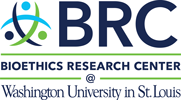Exploring Ethical Considerations When Using a Machine Learning Algorithm to Predict Brain Tumor Prognosis and Inform Surgical Decisions
GRANT
3R01CA203861-08S1
August 2024 – July 2025
KEY PERSONNEL
- Tristan McIntosh, PhD
Supplement Principal Investigator - Eric Leuthardt, MD
Supplement Co-Investigator; R01 PI
PROJECT MANAGERS
- Meredith Parsons, MS, CHES
Staff Scientist - Olivia Buckley
Graduate Research Assistant
RESOURCES
DESCRIPTION
This project is a supplement to the parent project, “Advancing Neurosurgical Neuron avigation Using Resting State MRI and Machine Learning” (R01CA203861; PIs Leuthardt and Shimony). A team at Washington University has developed an advanced computer algorithm that uses artificial intelligence (AI) to assist with the diagnosis of malignant glioblastoma brain tumors. This new advanced computer algorithm is a highly accurate predictor of prognosis and can be used by neurosurgeons to inform treatment decisions and approaches. However, the algorithm raises ethical concerns and risk factors that need to be addressed before it is used in practice. This project will identify ethical issues and possible solutions to help navigate ethical issues related to the implementation of this new advanced computer algorithm.
We will conduct in-depth interviews with three groups of stakeholders: 15 patients with malignant glioblastomas; 15 caregivers of people with malignant glioblastomas; and 15 neurosurgeons who treat malignant glioblastomas. Interviews will explore stakeholder perspectives on the role of this new advanced computer algorithm in prognosis prediction and treatment decision-making, as well as how it will impact doctor-patient relationships. The information gathered from these interviews will be used to inform the responsible development and implementation of this advanced computer algorithm.

